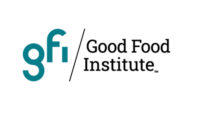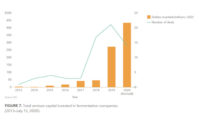$1.5 billion Invested in Alternative Proteins in 2020
New report reveals fermentation as the next pillar of alternative proteins, enabling a new wave of innovative products and accelerating the industry

According to report produced by The Good Food Institute (GFI), 2019 and the first seven months of 2020 were record periods of investment in fermentation companies creating sustainable alternatives to conventional animal-based foods and ingredients.
GFI’s fermentation state of the industry report is the first-ever analysis of the significant role and potential of microbial fermentation as a third pillar of the alternative protein industry, alongside plant-based proteins and cultivated meat. Fermentation—the use of microbes such as microalgae and mycoprotein—can be used to produce protein biomass, improve plant proteins, and create paradigm-changing functional ingredients, such as Impossible Foods’ heme. Fermentation technology is delivering a new wave of tasty, high-quality, sustainable, and efficiently-produced meat, egg, and dairy products.
GFI’s report analyzes investment activity in the industry and shows that globally, fermentation companies devoted to alternative proteins received more than $274 million in venture capital funding in 2019 and over 58% more in just the first seven months of 2020, $435 million—even as Covid-19 disrupted global markets.
Fermentation companies focused on alternative proteins have raised more than $837 million in venture capital funding, starting with the first GFI-tracked investment in 2013. Eighty-five% of this funding was raised in 2019 and in the first seven months of 2020 alone. The $274 million raised in 2019 is nearly five times the capital raised in 2018 and more than three times the capital raised in 2016 and 2017 combined. Investors in the space include Bill Gates-backed Breakthrough Energy Ventures, Temasek, Horizons Ventures, CPP Investment Board, Louis Dreyfus Co., Bunge Ventures, Kellogg, ADM Capital, Danone, Kraft Heinz, Mars, Tyson, SOSV, Viking Global, Thiel Capital, Generation Investment Management, Mayfield Fund, and Techstars.
Globally in 2019, fermentation companies raised 3.5 times more capital than cultivated meat companies worldwide and almost 60% as much as U.S. plant-based meat, egg, and dairy companies. Collectively, these alternative protein companies raised $820 billion in 2019. They raised a further $1.5 billion in the first seven months of 2020, which is 80% more than the 2019 full-year investment total. Investments in 2020 included the fermentation industry’s largest ever raise, Perfect Day’s $300 million Series C.
The fermentation-derived alternative protein industry goes back as far as 1985 when Quorn became its first commercial player. Quorn is now joined by a growing field of competitors. By mid-year 2020, 44 fermentation companies focused on alternative proteins had formed around the globe, and almost half are U.S.-based. Twenty-one of these 44 companies launched in 2019 and the first seven months of 2020 alone. This is a 91% increase from 23 companies in 2018.
Several of the world’s largest food and life science companies, including DuPont, Novozymes, and DSM, are also developing fermentation-derived product lines and solutions tailored to the alternative protein industry. Even JBS, the world’s largest meat company, is leveraging fermentation for alternative proteins through their new and mostly plant-based brand, Planterra Foods.
In addition to analyzing investment activity, GFI’s fermentation state of the industry report showcases the industry’s competitive landscape and production methods for the three key applications of fermentation in alternative proteins—traditional fermentation, biomass fermentation, and precision fermentation—as well as opportunities for technology development and cost reduction.
Looking for a reprint of this article?
From high-res PDFs to custom plaques, order your copy today!





